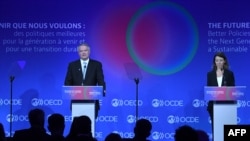The Ukraine war and COVID-19’s continued fallout delivered more grim economic news Wednesday, with the Paris-based Organization for Economic Cooperation and Development sharply lowering its global growth forecast and predicting rising inflation. The poorest people and countries may suffer the most.
The OECD slashed its global growth forecast to 3% this year — down from 4.5% the organization predicted only a few months ago. It estimates growth will slow even further in 2023.
The main culprit: Russia’s invasion of Ukraine.
“As a result of Russia’s war, global growth will be lower, and inflation will be higher for longer," said OECD Secretary-General Mathias Cormann. "Both business investment and private consumption growth have been hit, and the war has further exacerbated supply chain disruptions previously brought on by the pandemic, which is pushing up energy and food prices and causing significant price volatility.”
Representing 38 mostly developed countries, the OECD predicts the U.S. and Eurozone economies will grow by just 2.5% and 2.6% respectively this year — also down sharply from earlier forecasts.
Even China, handicapped by zero-COVID policies and vaccine shortages, will see its economy growing just 4.4% in 2022, compared to a previously forecasted 5.1%. Its slowdown is expected to put a further brake on global growth.
But the OECD’s chief economist Laurence Boone says the world’s poorest countries are the biggest worry.
“We’re very concerned about the food situation in low-income countries. The war is really sending shockwaves all the way to Africa and the Middle East,” she said.
Many of these countries depend on wheat from Ukraine and Russia to feed their people.
“The war could spark starvation. It could cause social unrest and political turmoil,” she said.
The OECD’s forecast follows equally dark global outlooks by both the World Bank and the International Monetary Fund.
The Paris-based body advises a raft of measures to turn around the trajectory, including more aid to developing countries and more global cooperation. Also key: investing in green energy to end dependence on countries like Russia, a key exporter of fossil fuels.





